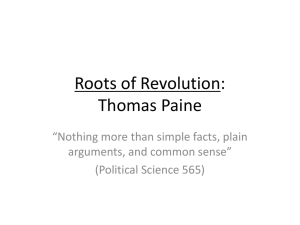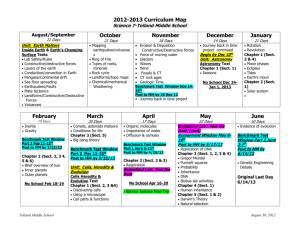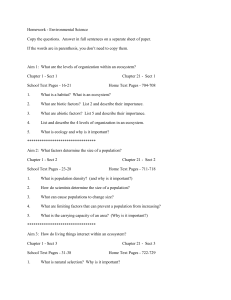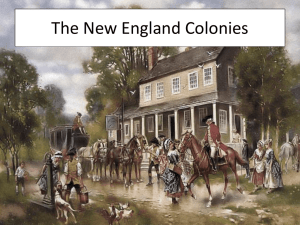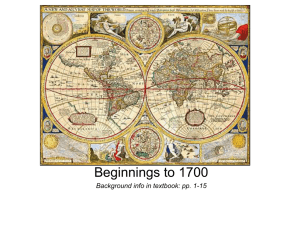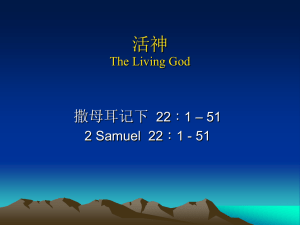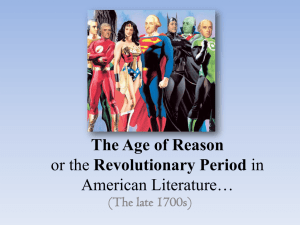Week 02: Winthrop & Paine
advertisement
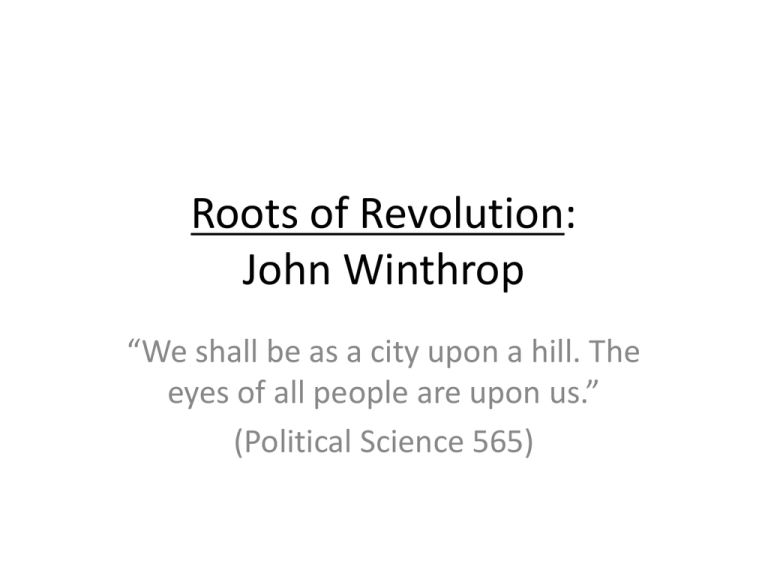
Roots of Revolution: John Winthrop “We shall be as a city upon a hill. The eyes of all people are upon us.” (Political Science 565) Big Questions • What is the appropriate balance between state and federal power? • Is the United States a single nation or a confederation of states? • Who is, and who can be, an American? • What is an American? • How can the legacies of slavery be addressed? • What does it mean to be free? What does it mean to be equal? • What counts as power? 2 The English Civil War • 1642-1651 • Charles I & Parliament – Charles I tried for treason, executed 1649 • Anglicans, Catholics, Puritans – Puritans desire a life that is more, not less, regulated • Republic, Constitutional Monarchy, Absolutist Monarchy • Oliver Cromwell & the New Model Army 3 John Winthrop • 1588-1649 • Leader of 1630 wave of Puritan immigrants – Left for New England after Charles I married a Catholic & cracked down on nonconforming religious groups • Governor of Massachusetts Bay Colony for 12 years • Favored clerical government, placed religious law above civil law 4 Puritans in America • The previous migrants, the Pilgrims, had been driven out of England, but The Great Migration of 1630 was different: – Not driven out of England, they left by their own decision • A contract between the community and God – Winthrop: “Thus stands the cause between God and us. We are entered into covenant with Him for this work. We have taken out a commission. The Lord hath given us leave to draw our own articles. We have professed to enterprise these and those accounts, upon these and those ends. We have hereupon besought Him of favor and blessing.” • Community emphasis pervasive 5 Covenant • “Now if the Lord shall please to hear us, and bring us in peace to the place we desire, then hath He ratified this covenant and sealed our commission, and will expect a strict performance of the articles contained in it; • but if we shall neglect the observation of these articles which are the ends we have propounded, and, dissembling with our God, shall fall to embrace this present world and prosecute our carnal intentions, seeking great things for ourselves and our posterity, • the Lord will surely break out in wrath against us, and be revenged of such a people, and make us know the price of the breach of such a covenant.” 6 City on a Hill • “For we must consider that we shall be as a city upon a hill. The eyes of all people are upon us. So that if we shall deal falsely with our God in this work we have undertaken, and so cause Him to withdraw His present help from us, we shall be made a story and a by-word through the world. – We shall open the mouths of enemies to speak evil of the ways of God, and all professors for God's sake. We shall shame the faces of many of God's worthy servants, and cause their prayers to be turned into curses upon us till we be consumed out of the good land whither we are going.” 7 • “[W]e are commanded this day to love the Lord our God, and to love one another, to walk in his ways and to keep his Commandments and his ordinance and his laws, and the articles of our Covenant with Him, that we may live and be multiplied, and that the Lord our God may bless us in the land whither we go to possess it. – But if our hearts shall turn away, so that we will not obey, but shall be seduced, and worship other Gods, our pleasure and profits, and serve them; it is propounded unto us this day, we shall surely perish out of the good land whither we pass over this vast sea to possess it.” 8 Transformation • The mission had been to demonstrate the possibilities of Puritan government for imitation in in Europe – Winthrop: “We shall find that the God of Israel is among us, when ten of us shall be able to resist a thousand of our enemies; when He shall make us a praise and glory that men shall say of succeeding plantations, ‘may the Lord make it like that of New England.’” • But the mission failed – But victorious English Puritans moved to toleration, abandoning the political project of the New England Puritans – NE Puritans like actors on empty stage 9 Why had the mission failed? • Can’t be God’s fault, so must look to themselves • Self-criticism & jeremiad • It must have been because we did something wrong • Alone with themselves in America • Without the divine mission, who are they? What are they doing? 10 Christian Republicanism • In the colonies that would become the United States, republican and Protestant convictions merged as they did nowhere else in the world. • Initially, concerns with transcendental religious concerns leaves republicanism a secondary concern • The terms of slavery, citizen, freedom, virtue and vice become key terms of colonial Christianity 11 Mid-18th C. conflicts between France and Britain in N. America • Anti-Catholicism – Samuel Davies, 1755: “‘Our religion, our liberty, our property, our lives, and everything sacred to us are in danger,’ especially of being ‘enslaved’ by ‘an arbitrary, absolute monarch’ enforcing conformity to ‘the superstitions and idolatries of the church of Rome.’” • A fusion of republican and religious values 12 Toward the Republic • The fusion of religious and republican language acted as a ‘disinfectant’ for republican ideas of which believers might have otherwise regarded with suspicion. – Thomas Paine, Common Sense • Religious language used to generate support for the revolution – “a new Israel” • Arguments for split from Britain acquired the emotive force & legitimacy of religion. I – Religious values migrated along with religious terms into the political speech and so changed political values. – But the migration also moved the other way: A religious language put to political use took on political values that altered the substance of religion. 13 Causes of Revolution • Economic exploitation by England – Taxation, forcible quartering of soldiers, violation of property rights • Legal domination – British soldiers to be tried only in England, forced alteration of MA charter, restriction of town meetings • Governmental oppression – Colonies have no say in taxation, diminished voice in own gov’t 14 Thomas Paine • B. Feb. 9 1737, Thetford, England • Arrives in American colonies 1774 • Common Sense: 1776 • Rights of Man: 1790, supporting French Revolution, elected to National Convention, imprisoned by Robespierre 1793 • Age of Reason: 1794, 1795, 1807 • Returns to US 1803 • Dies 1809 15 Common Sense • January, 1776 • Massively influential – Before its publication, about 1/3 of American colonials supported the break from Britain, 1/3 opposed, and 1/3 were undecided – After, it was closer to 2/3 in favor of Revolution • Focused strongly on the containment of governmental power – Reason vs. passion, tradition 16 Common Sense • Against the power of tradition & emotion: – Disinterested reason should be the guide to political action • “In the following pages I offer nothing more than simple facts, plain arguments, and common sense; and have no other preliminaries to settle with the reader, than that he will divest himself of prejudice and prepossession, and suffer his reason and his feelings to determine for themselves; that he will put on, or rather that he will not put off, the true character of a man, and generously enlarge his views beyond the present day.” (section 4) 17 Common Sense • Against the power of tradition & emotion: • “Wherefore, laying aside all national pride and prejudice in favor of modes and forms, the plain truth is, that it is wholly owing to the constitution of the people, and not to the constitution of the government that the crown is not as oppressive in England as in Turkey.” (section 2) 18 Common Sense • Against the influence of interest & bias: – “Though I would carefully avoid giving unnecessary offence, yet I am inclined to believe, that all those who espouse the doctrine of reconciliation, may be included within the following descriptions: • “Interested men, who are not to be trusted; weak men who cannot see; prejudiced men who will not see; and a certain set of moderate men, who think better of the European world than it deserves; and this last class by an ill-judged deliberation, will be the cause of more calamities to this continent than all the other three.” (sect. 4) 19 Common Sense • Reason is believed to be – Impartial & unbiased – A method of reaching universal & definitive truth • All rational individuals will agree – Comprehensible by anyone not blinded by passion or bias, regardless of social station (“common sense”) • Rationality as freedom • What do we do with irrational people? – Inherently democratic • Thus, it is for Paine the source of just political authority – The sole reliable means of accessing truth • Not an opinion – The revolutionary potential of the claim to new truth – Reason as totalized social critique 20 Common Sense • By grounding political authority in reason, Paine is able to make a persuasive argument undermining the foundations of British government, which is based in tradition, religion, and custom. – “I am not induced by motives of pride, party, or resentment to espouse the doctrine of separation and independence; I am clearly, positively, and conscientiously persuaded that it is the true interest of this continent to be so.” (sect. 4) 21 Common Sense • What’s so bad about kings? (section 3) – The State of Nature as tool of criticism – “But there is another and greater distinction for which no truly natural or religious reason can be assigned, and that is, the distinction of men into KINGS and SUBJECTS.” (sect. 3) • A government must not make things worse than they are in the State of Nature if they are to deserve compliance 22 • What’s so bad about kings? The Bible, often used as a source of legitimacy by kings, is in fact anti-monarchical • Samuel vs. a King for Israel (1 Samuel 8) – God & Samuel oppose (only God is king) – People demand king – Taxation, war, oppression the costs of kingship • Capturing the past Thus, kingship is purely a human creation, no more inherently valid or necessary than any other. 23 Common Sense • Why is independence necessary? (sect. 4) – England is violently oppressive, exploiting America for the good of England – England is too far away to govern America effectively, even if it wanted to. – Being a part of the British Empire will inevitably involve America in unnecessary imperial conflicts. 24 Common Sense • “Society is produced by our wants, and government by our wickedness; the former promotes our happiness Positively by uniting our affections, the latter negatively by restraining our vices. The one encourages intercourse, the other creates distinctions. The first is a patron, the last a punisher.” – The true end of government is security. (sect. 2) – To what extent are gov’t & society analytically separable? 25 Common Sense • Freedom, happiness, & efficiency the basis of just government • How to achieve this? – Commerce • Trade Peace – Local government with weak central government • • • • Each colony equally represented Each colony retains sovereignty Weak executive (needs 60% congressional approval to pass laws) Continental Charter, guaranteeing political freedom, property, freedom of religion – Religious toleration – Rule of Law 26 Common Sense • Rule of Law (sect. 5) • “Let a day be solemnly set apart for proclaiming the charter; let it be brought forth placed on the divine law, the word of God; • let a crown be placed thereon, by which the world may know, that so far as we approve of monarchy, that in America THE LAW IS KING. • For as in absolute governments the King is law, so in free countries the law ought to be King; and there ought to be no other. But lest any ill use should afterwards arise, let the crown at the conclusion of the ceremony be demolished, and scattered among the people whose right it is. A government of our own is our natural right.” 27 Common Sense • American exceptionalism: – “The sun never shined on a cause of greater worth. 'Tis not the affair of a city, a country, a province, or a kingdom, but of a continent of at least one eighth part of the habitable globe. 'Tis not the concern of a day, a year, or an age; posterity are virtually involved in the contest, and will be more or less affected, even to the end of time, by the proceedings now.” (sect. 1) • The city on a hill & cause of all humanity 28 Common Sense • “Let the names of Whig and Tory be extinct; and let none other be heard among us, than those of a good citizen, an open and resolute friend, and a virtuous supporter of the RIGHTS of MANKIND and of the FREE AND INDEPENDENT STATES OF AMERICA.” (sect. 6) – What does it mean to define your cause as that of all humanity? 29
